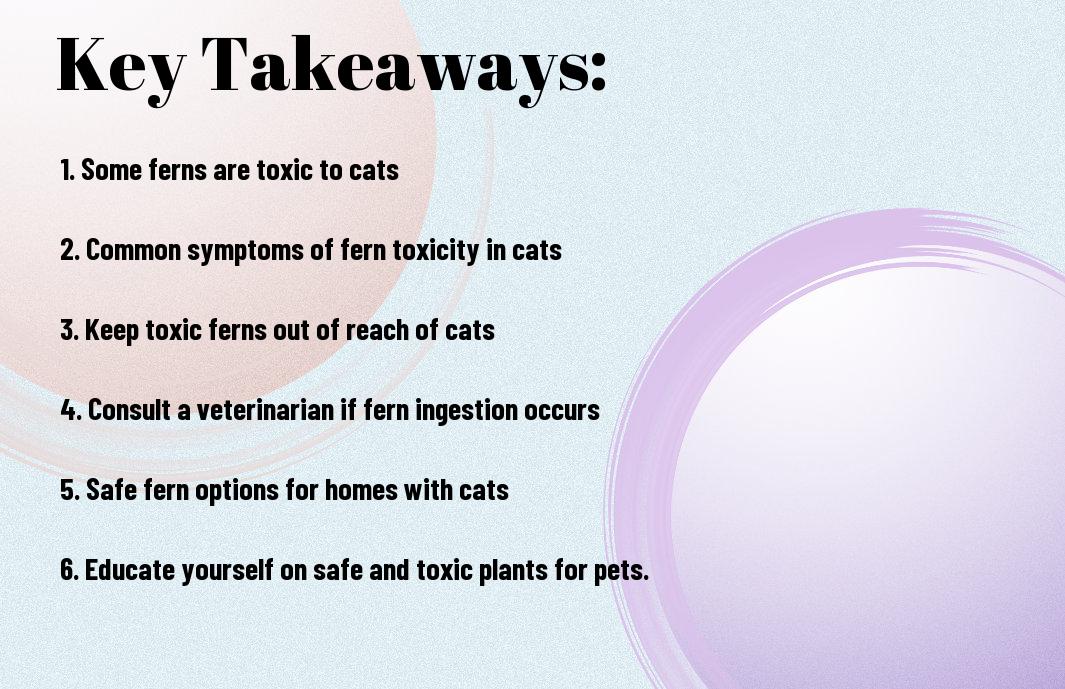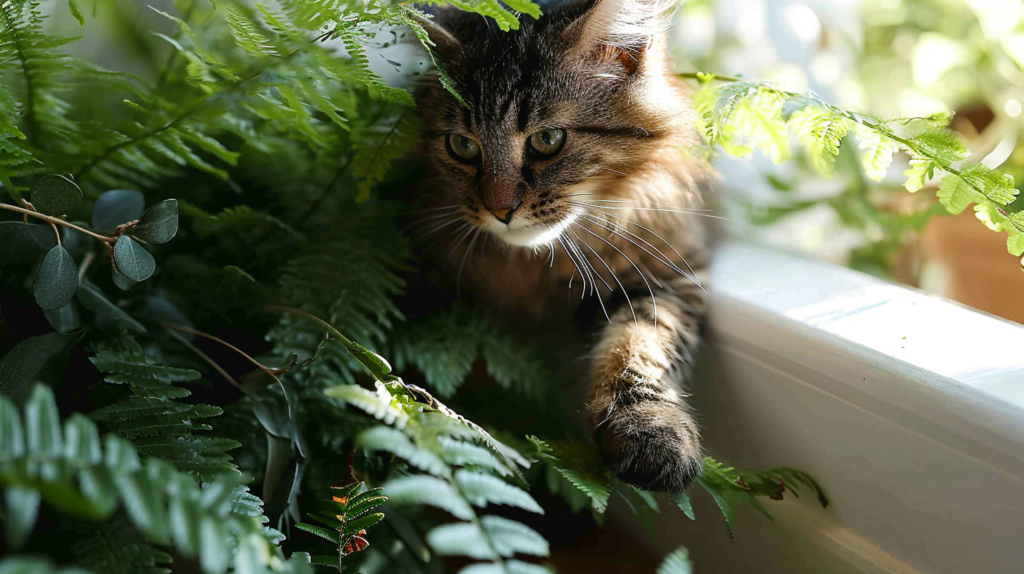Unbeknownst to many pet owners, certain types of ferns can pose a serious threat to the health of your feline friend. While these lush, leafy plants can add a touch of greenery to your home, it’s essential to be aware of the potential dangers they may pose to your furry companion. Ingesting certain varieties of ferns can lead to toxic reactions in cats, ranging from gastrointestinal upset to more serious symptoms. It’s important to know which fern species are safe to keep in your home and which ones you should avoid to ensure the well-being of your cat.

Overview of Ferns
Assuming you are considering getting a fern in your home and you’re concerned about the potential toxicity to your cats, it is important to first understand the basic characteristics of ferns. Ferns are a type of vascular plant that reproduce via spores, rather than seeds. They are known for their large, feather-like leaves and are commonly found in tropical and subtropical regions.
Different Species of Ferns
There are over 12,000 species of ferns, each with its own unique characteristics and growing requirements. Some common species include the Boston fern, maidenhair fern, and bird’s nest fern. It’s important to note that while some ferns may be non-toxic to cats, others can pose a potential danger to your feline friend.
General Characteristics of Ferns
Ferns are typically found in moist, shaded environments and are known for their ability to thrive in low-light conditions. They are popular houseplants due to their attractive foliage and air-purifying properties. However, it’s crucial to be aware of the potential risks these plants may pose to your pets, as ingestion of certain fern species can be toxic to cats.
Toxicity in Plants
Now, let’s delve into the topic of plant toxicity and how it relates to your feline friends. As a responsible pet owner, it’s crucial to be aware of the potential dangers that certain plants can pose to your cats.
How Plants Can Be Toxic to Cats
Plants can be toxic to cats in various ways. Some plants contain substances that are harmful when ingested, while others may cause skin irritation upon contact. Additionally, certain plants can even release toxic pollen or sap. It’s important to recognize that not all toxic plants will have the same effect on every cat, and the severity of the reaction can vary from mild to severe.
Identifying Signs of Toxicity in Cats
Recognizing the signs of plant toxicity in cats is essential for prompt intervention. Common symptoms of plant poisoning in cats include vomiting, diarrhea, lethargy, difficulty breathing, and changes in behavior. If you notice any of these signs in your cat and suspect plant poisoning, it is crucial to seek veterinary care immediately.
Ferns and Their Effects on Cats

Not all ferns are toxic to cats, but some varieties can have harmful effects if ingested. It’s important to be aware of the different types of ferns and their potential impact on your feline friend.
Non-Toxic Varieties of Ferns
If you’re a cat owner, you’ll be glad to know that there are several non-toxic varieties of ferns that you can safely keep in your home without worrying about your pet’s health. Boston Ferns, Maidenhair Ferns, and Staghorn Ferns are all safe choices to introduce into your indoor garden. These ferns are not only beautiful additions to your home, but they also provide a safe and inviting environment for your curious and playful feline.
Toxic Varieties of Ferns and Their Symptoms
However, there are certain varieties of ferns that can be toxic to your cat if ingested. These include Asparagus Fern, Emerald Fern, and Lace Fern. If your cat happens to nibble on these toxic ferns, it could lead to symptoms such as vomiting, diarrhea, abdominal pain, and even depression. In severe cases, it could even cause difficulty breathing or seizures. If you suspect that your cat has ingested any toxic fern, it’s crucial to seek immediate veterinary attention to ensure their well-being.
Regardless of the type of fern you choose to keep, it’s important to be mindful of your cat’s curious nature and take necessary precautions to keep toxic varieties out of reach. This includes placing ferns in areas that are inaccessible to your cat or incorporating deterrents such as bitter apple spray to discourage them from exploring the plants. By being aware and proactive, you can create a safe and harmonious environment for both your cat and your ferns.
What Makes Ferns Toxic to Cats and Are Orchids Similarly Toxic?
While ferns contain chemical compounds causing digestive upset in cats, “orchids and cat toxicity” is less concerning. Most orchids are non-toxic to felines, allowing pet owners to display these blooms without fear, unlike certain ferns which must be kept out of paw’s reach.
Prevention and Treatment
Unlike some other plant toxicities, there is no specific antidote for fern toxicity in cats. Therefore, the best way to protect your feline friend is to prevent exposure to toxic ferns in the first place. If you suspect your cat has ingested any part of a toxic fern, it’s essential to seek immediate veterinary assistance. Prompt treatment can save your cat’s life.
Creating a Safe Environment for Pets
When it comes to preventing fern toxicity in cats, the most effective approach is to keep all toxic ferns out of your home and garden. Make sure to research the specific species of ferns you have to determine whether they are toxic to cats. If you do have toxic ferns, consider replacing them with pet-friendly alternatives. Additionally, be mindful of any ferns your cat may encounter during outdoor adventures, such as during walks or time spent in your yard. By creating a safe environment for your pet, you can minimize the risk of fern toxicity.
Treating Fern Toxicity in Cats
If you suspect that your cat has ingested a toxic fern, it’s crucial to seek immediate veterinary care. The veterinarian may induce vomiting, administer activated charcoal to absorb the toxins, provide supportive care, and in severe cases, hospitalization may be necessary. The sooner your cat receives treatment, the better the outcome is likely to be. Do not attempt to treat your cat at home, as this can be dangerous and delay essential medical intervention.
Wrapping Up
Now you know that certain types of ferns can be toxic to cats if ingested. It’s important to be mindful of the plants you bring into your home and ensure they are safe for your furry friends. If you do have ferns in your home, be sure to keep them out of reach of your pets and monitor your cat’s behavior around the plants. If you suspect your cat has ingested any part of a toxic fern, contact your veterinarian immediately. Your cat’s safety is your top priority, so it’s essential to educate yourself on the potential dangers of certain plants and take necessary precautions to keep your pet safe.
FAQ
Are ferns toxic to cats?
Yes, some varieties of ferns are toxic to cats. While most ferns are considered non-toxic, it’s important to have knowledge of the specific type of fern you have in your home to ensure the safety of your feline companion.
What are the typical symptoms of fern toxicity in cats?
Symptoms of fern toxicity in cats may include vomiting, diarrhea, drooling, difficulty breathing, and loss of appetite. In severe cases, ingestion of toxic ferns can lead to liver or kidney damage, and in extreme cases, could be fatal to the cat.
How can I prevent fern toxicity in cats?
To prevent fern toxicity in cats, it’s important to either choose non-toxic varieties of ferns for your home, or to keep toxic ferns out of reach of your cat. Additionally, if you suspect your cat has ingested a toxic fern, seek immediate veterinary attention. It’s always best to err on the side of caution when it comes to the health and safety of your beloved pet.

Hello there, I am Iftekhar Ahmed. I am the owner of Mishka & The Cat Corners. I love to explore and write on various topics about cats

